300 scholarly books by Brandeis University Press and 7
start with T
300 scholarly books by Brandeis University Press and 7
300 scholarly books by Brandeis University Press
7 start with T start with T
7 start with T start with T
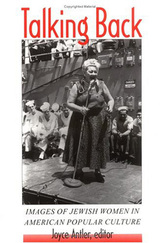
Talking Back
Images of Jewish Women in American Popular Culture
Edited by Joyce Antler
Brandeis University Press, 1998
Fourteen provocative essays challenge traditional notions of Jewish female identity presented in mass media images, films, narrative, and stories by portraying the American Jewish woman not only as subject but as shaper of American popular culture. Sometimes internalizing negative presentations but more often "talking back" to them, Jewish women created alternative images that became tools of rebellion, subverting and dismantling such stereotypes as the "Yiddishe Mama," the Jewish Mother, and the Jewish American Princess. Over the course of the century -- and particularly as a consequence of feminism -- Jewish female novelists, screenwriters, dramatists, entertainers, and grass-roots feminists were able to create new possibilities for the expression of Jewish women's voices.
[more]

Teaching Israel
Studies of Pedagogy from the Field
Edited by Sivan Zakai and Matt Reingold
Brandeis University Press, 2024
An edited volume that grapples with the complex issues and conflicts that face instructors developing curricula about Israel.
Jewish Americans are divided in their views on Israel. While scholars have outlined philosophical principles to guide educators who teach about Israel, there has been less scholarship focused on the pedagogy surrounding the country. This book resituates teaching—the questions, dilemmas, and decision-making that teachers face—as central to both Israel studies and Israel education. Contributors illuminate how educators from differing pedagogical orientations, who teach in a range of educational settings learn, understand, undertake, and ultimately improve the work of teaching Israel. The volume also looks at the professional support and learning opportunities teachers may need to engage with these pedagogical questions.
Jewish Americans are divided in their views on Israel. While scholars have outlined philosophical principles to guide educators who teach about Israel, there has been less scholarship focused on the pedagogy surrounding the country. This book resituates teaching—the questions, dilemmas, and decision-making that teachers face—as central to both Israel studies and Israel education. Contributors illuminate how educators from differing pedagogical orientations, who teach in a range of educational settings learn, understand, undertake, and ultimately improve the work of teaching Israel. The volume also looks at the professional support and learning opportunities teachers may need to engage with these pedagogical questions.
[more]
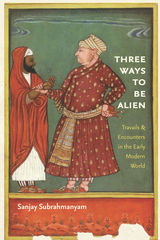
Three Ways to Be Alien
Travails and Encounters in the Early Modern World
Sanjay Subrahmanyam
Brandeis University Press, 2011
Sanjay Subrahmanyam’s Three Ways to Be Alien draws on the lives and writings of a trio of marginal and liminal figures cast adrift from their traditional moorings into an unknown world. The subjects include the aggrieved and lost Meale, a “Persian” prince of Bijapur (in central India, no less) held hostage by the Portuguese at Goa; English traveler and global schemer Anthony Sherley, whose writings reveal a surprisingly nimble understanding of realpolitik in the emerging world of the early seventeenth century; and Nicolò Manuzzi, an insightful Venetian chronicler of the Mughal Empire in the later seventeenth century who drifted between jobs with the Mughals and various foreign entrepôts, observing all but remaining the eternal outsider. In telling the fascinating story of floating identities in a changing world, Subrahmanyam also succeeds in injecting humanity into global history and proves that biography still plays an important role in contemporary historiography.
[more]
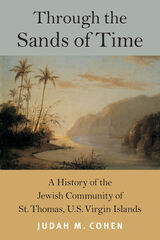
Through the Sands of Time
A History of the Jewish Community of St. Thomas, U.S. Virgin Islands
Judah M. Cohen
Brandeis University Press, 2012
In 1796, the Jews of St. Thomas founded the first Jewish congregation on this Caribbean island. By 1803, new arrivals from England, France, and the neighboring islands of St. Eustatius and Curaçao increased the original number from a handful of congregants to twenty-two families. Their small synagogue was destroyed by fires and rebuilt several times. The congregation numbered sixty-four families by the time the present synagogue was erected in 1833. It is by now the oldest synagogue in continuous use under the American flag. The congregation was also among the first to receive copies of the new West London Reform liturgy when it came out in 1841 and the first in this hemisphere to hold a Jewish confirmation ceremony, two years later. In addition, the St. Thomas Synagogue has produced its own unique religious literature relating to hurricanes! While the synagogue has served for over 200 years as a central religious and social gathering place, the Jews of St. Thomas have been highly mobile members of a progressive, cosmopolitan society that at times rivaled any in the world. As an accepted part of the larger community, members were accomplished, model citizens in a highly tolerant Danish colonial society. Jews took positions in government, served as auctioneers, participated in the local Masonic lodges, and represented other countries as consuls in St. Thomas. As traders in a mercantile culture, the Jews contributed to the activity of one of the world’s busiest harbors and played a crucial role in St. Thomas’s nineteenth-century rise to prominence in the northern Caribbean.
[more]
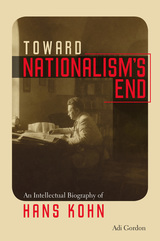
Toward Nationalism's End
An Intellectual Biography of Hans Kohn
Adi Gordon
Brandeis University Press, 2017
This intellectual biography of Hans Kohn (1891–1971) looks at theories of nationalism in the twentieth century as articulated through the life and work of its leading scholar and activist. Hans Kohn was born in late nineteenth-century Prague, but his peripatetic life took him from the Revolutionary-era Russia to interwar-era Palestine under the British Empire to the United States during the Cold War. Bearing witness to dramatic reconfigurations of national and political identities, he spearheaded an intellectual revolution that fundamentally challenged assumptions about the “naturalness” and the immutability of nationalism. Reconstructing Kohn’s long and fascinating career, Gordon uncovers the multiple political and intellectual trends that intersected with and shaped his theories of nationalism. Throughout his life, Kohn was not simply a theorist but also a participant in multiple and often conflicting movements: Zionism and anti-Zionism, pacifism, liberalism, and military interventionism. His evolving theories thus drew from and reflected fierce debates about the nature of internationalism, imperialism, liberalism, collective security, and especially the Jewish Question. Kohn’s scholarship was not an abstraction but a product of his lived experience as a Habsburg Jew, an erstwhile cultural Zionist, and an American Cold Warrior. As a product of the times, his concepts of nationalism reflected the changing world around him and evolved radically over his lifetime. His intellectual biography thus offers a panorama of the dynamic intellectual cornerstones of the twentieth century.
[more]
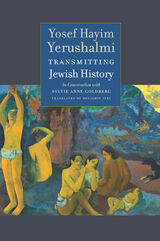
Transmitting Jewish History
Yosef Hayim Yerushalmi in Conversation with Sylvie Anne Goldberg
Yosef Hayim Yerushalmi and Sylvie Anne Goldberg
Brandeis University Press, 2021
The deeply personal reflections of a giant of Jewish history.
Scholar Yosef Hayim Yerushalmi (1932–2009) possessed a stunning range of erudition in all eras of Jewish history, as well as in world history, classical literature, and European culture. What Yerushalmi also brought to his craft was a brilliant literary style, honed by his own voracious reading from early youth and his formative undergraduate studies. This series of interviews paints a revealing portrait of this giant of history, bringing together exceptional material on Yerushalmi’s personal and intellectual journeys that not only attests to the astonishing breakthrough of the issues of Jewish history into “general history,” but also offers profound insight into being Jewish in today's world.
Scholar Yosef Hayim Yerushalmi (1932–2009) possessed a stunning range of erudition in all eras of Jewish history, as well as in world history, classical literature, and European culture. What Yerushalmi also brought to his craft was a brilliant literary style, honed by his own voracious reading from early youth and his formative undergraduate studies. This series of interviews paints a revealing portrait of this giant of history, bringing together exceptional material on Yerushalmi’s personal and intellectual journeys that not only attests to the astonishing breakthrough of the issues of Jewish history into “general history,” but also offers profound insight into being Jewish in today's world.
[more]
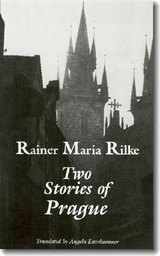
Two Stories of Prague
King Bohush The Siblings
Rainer Maria Rilke
Brandeis University Press, 1996
Two Stories of Prague signifies the maturation of a poet and of a people. Although most readers know Rilke as a mature, cosmopolitan poet, here we can discern a young writer self-consciously exploring his development as a man and his emergence as an artist. Angela Esterhammer writes that in symbolic, stylistic, and biographical terms these stories "record the process by which Rilke fashions himself into an independent, empowered individual."
[more]
READERS
Browse our collection.
PUBLISHERS
See BiblioVault's publisher services.
STUDENT SERVICES
Files for college accessibility offices.
UChicago Accessibility Resources
home | accessibility | search | about | contact us
BiblioVault ® 2001 - 2024
The University of Chicago Press









